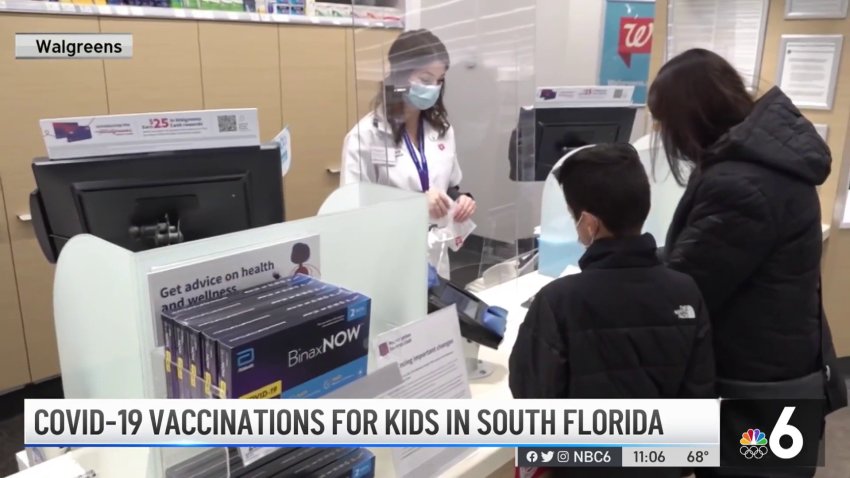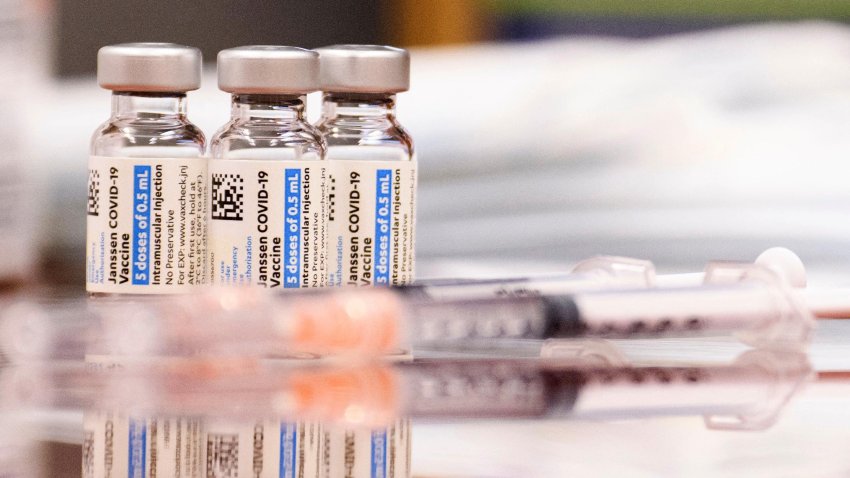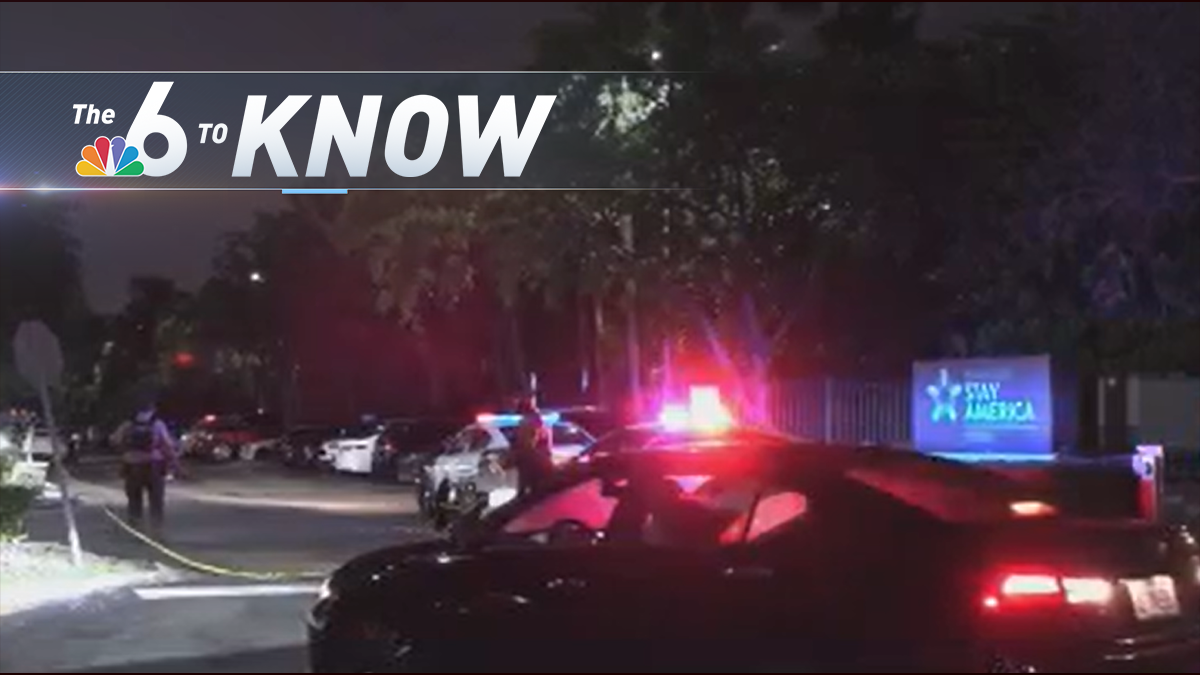The COVID-19 vaccine for kids has arrived. While many parents are relieved that children in the 5-11 age group can now be inoculated against the virus, others have concerns about side effects and potential risks. Moms With A Mic talked to Dr. Danielle Squires, a local pediatrician, to gain insight behind some common misconceptions about the vaccine, as well as answer questions from viewers about the vaccine for kids. (Note: This video was originally broadcast on Facebook Live.)
About 900,000 kids ages 5 to 11 have received their first dose of Pfizer's Covid-19 vaccine since U.S. regulators cleared the shots for the younger age group Nov. 2, the White House said Wednesday.
As more and more parents decide to vaccinate their children against COVID-19, many still have some lingering concerns about the possible side effects, efficacy and long-term impacts the vaccine may have on their child.
Watch NBC6 free wherever you are
Moms With a Mic's Marissa and Julia Bagg sat down with Dr. Danielle Squires of Kings Bay Pediatrics to discuss some of these concerns and answer questions from South Florida parents regarding the COVID-19 vaccine for kids.
Get local news you need to know to start your day with NBC 6's News Headlines newsletter.
Dr. Danielle Squires on Vaccinating Children
Moms with a Mic: Dr. Squires, we know your son is six and you just took him to get vaccinated. Tell us about that.
Dr. Squires: Yes. So I have two kids ages three and six. My six-year-old son went for his vaccine on Saturday, which was the first day that it was available. I took him to Walgreens. It was really seamless. I made the appointment online, we showed up, they were welcoming and they were prepared for kids. He got a lollipop at the end. It was a great experience.
Local
Moms with a Mic: How's he feeling now?
Dr. Squires: Great. He had no issues. I was anticipating at least a sore arm, but he really didn't feel much of anything.
Moms with a Mic: What might you say to anyone who you know is kind of on the fence, maybe not rushing in to bring their kids? Why should they go ahead and not waste any more time?
Dr. Squires: I think the sooner that we can get those vaccines at arms, the safer your child is, the safer we all are. Unfortunately we're coming into the holidays and exposures may increase over the holidays. The study that was done on kids that was released by Pfizer was very convincing. It showed a robust immune response, over 90 percent effectiveness in kids, similar to adults, and it had a very manageable side effect profile -- the most common being a sore arm. Like adults, kids may have a fever or fatigue -- some of those other side effects in the day or two after they get their their vaccine, but really minimal in terms of side effects. And the benefit is just tremendous.
Moms with a Mic: Dr. Squires, one mom I was just talking to the other day who tells me she's a little nervous about it because she feels like this is still so new. What would you say to her, perhaps when it comes to vaccinating her three kids?
Dr. Squires: I absolutely understand it. It is new for kids five to 11, but it is not new for everyone. And when we look at how well we've done with this vaccine already --we've given hundreds of millions of Americans this vaccine. It's the same vaccine that mom probably already received, but her child is going to get a smaller dose -- about a third of the dose of the Pfizer vaccine. We've had about a year of experience now with this vaccine. And in the adolescent population, 12 and up, we've been giving it since May, so we've had we've had a good amount of time to kind of observe it and to monitor the side effects.

Debunking Misinformation About COVID-19 and Kids
Moms with a Mic: We spoke kind of in-depth about myocarditis and a little bit of the misconception there. How rare is it to begin with, with the vaccine, and how it can be more common if your kid potentially gets sick?
Dr. Squires: Yes, you just really summed it up. Myocarditis is a rare side effect of the vaccine, but it tends to be most prevalent in the general population in the teen years and 20s and in males. Vaccine or not, it is very, very rare, on the order of about one in 50,000. However, the number of cases of myocarditis from COVID are exponentially higher.
Moms with a Mic: Talk to us about what you've seen in your practice. What has been seen at the ICU? And unfortunately, I know that there have been a few kids in this age group, five to 11, that passed away.
Dr. Squires: Yes. And certainly more kids have passed away from COVID-19 than the flu on a typical year -- which people always try to liken it to flu in this age group. There's definitely a difference. And if you look at kids in general, we're looking at about 700 children who have died of COVID-19 in the United States since this began. And that's not counting the ICU kids with long haul COVID, kids with multisystem organ system and lamotrigine problems that have come up after the fact as well. So, there's there's definitely an increased disease burden from people who compare this to regular childhood illnesses.
What is the Possibility of a 'Twindemic'?
Moms with a Mic: This is a term that is kind of new to me, but the idea of a 'twindemic' where we could still have significant cases of COVID 19 as well as the flu? Is that something you're you're concerned about at all?
Dr. Squires: That's definitely something that I'm concerned about. ... This year, I think kids, even more than adults, will come in with multiple viruses at the same time. So you might come in and your children may have strep throat and a cold at the same time. That's just the nature of kids, especially if they're in school preschool, early childhood, they get sick all the time. But right now, if you're looking at a situation where you have flu, which can knock you out for a week in high fevers and coughing and puts you at risk for pneumonia and other things, and then COVID, which can do many of those same things too, it's definitely a riskier situation. So we're encouraging everybody to get their flu shots. Flu shots and COVID-19 vaccines can be given together. You walk into a Walgreens or CVS, and they can give it to you together.

Parents' Concerns About the Fast Approval of the COVID-19 Vaccine for Kids
Moms with a Mic: This vaccine was approved after six months. We don't know all the risks yet. How do you respond to that, doctor?
Dr. Squires: So I think we have good data. I think they used true evidence-based medicine when they're looking at these studies. If we're going to wait for years-long longitudinal studies, we're going to have a bad situation with COVID on our hands. But what we do know about vaccines is that we don't see issues long term, we see issues in the short term, just like when you give your kids all the other vaccines routinely throughout the year. I think while nothing is 100 percent certain and there's going to be risks with everything we do, the safest bet is to be vaccinated for COVID-19.
Moms with a Mic: And the study that was done involved 3000 kids.
Dr. Squires: Yeah, 3000 kids got the active vaccine versus placebo. There was another population on top of that, that got the placebo and the side effects were very, very minimal. There was no myocarditis within that study, and it was truly, what we've been seeing: a little fatigue, a little headache, possibly some fever, but really a very natural side effect profile.
Moms with a Mic: Something that you said that even surprised me was that we can compare a little bit -- it's not exact -- but how this group of children five to 11 are doing compared to how 12 to 17 did, compared to how 18 and up did, because even though the ages are different and the dose is different, it's not as different as the rest of us may think.
Dr. Squires: Yeah, and it's the same same vaccine, smaller dose. I mean, you look at the kids getting the vaccine now, it's not so different for an eight, nine, 10-year-old to be getting a vaccine compared to the 12-year-old who's been getting it since May. And that age group did wonderfully well, and it was very, very effective and had a great immune response. So far, it's been very positive.
Moms With a Mic and NBC 6 would like to note that parents should consult with their child's pediatrician before deciding to vaccinate their child against COVID-19.



